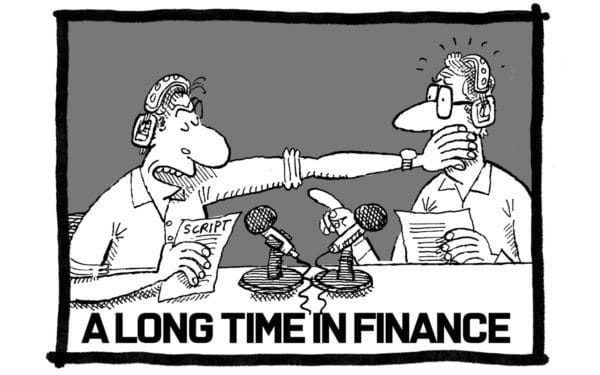Bad figures take longer to add up than good ones, and it seems to apply to Britain’s Treasury as much as to reporting companies, with the decision to avoid the inevitable Halloween headlines and take another fortnight to allow Jeremy Hunt to try and smuggle a plausible package past the Cerberus at the Office for Budget Responsibility.
My Shadow Shadow Chancellor, Savij Kutz, would like to help Mr Hunt in his quest to reconcile the irreconcilable without causing the fissile Tory party to split again. Top of the list must surely be the white elephant on rails, currently boring its way though the Buckinghamshire countryside. Its supporters still pretend that the sums add up, but you can tell their hearts are no longer in the calculation.
Mr Hunt has never been HS2’s biggest fan, but with tears in his eyes he can explain that he is scrapping the “nice to have” projects of a larger size because of the National Emergency he has inherited from the last lot (never mind that they were his colleagues). That would save around £10bn a year for the foreseeable future. The tunnels could be mothballed or turned into subterranean theme parks, and the expensively-acquired real estate sold back to its former owners.
Next is the Ajax light tank. For a laugh, read the puff piece from 2016 about a “new family of fighting vehicles” and compare it with the reality: £3.2bn of the £5.5bn budget spent, and the number delivered is rather less than the number of servicemen who have been deafened by the noise inside the vehicle. An independent review of the fiasco is still months away, having served its purpose to deflect the political heat from the MoD.
Unfortunately, it is too late to cancel Gordon Brown’s aircraft carriers. One has had to scurry back home for major repairs, which hardly matters since we had to borrow planes from the US to try and fill the other one. Neither is much help to Ukraine. If Mr Hunt could somehow improve defence procurement, there would be no need to spend the mooted 3 per cent of GNP on the military.
Then there is the oft-promised bonfire of quangoes. These things are almost too numerous to count and harder to eliminate than bedbugs, but no chancellor will ever get a better moment to fumigate them. There will be tears before bedtime, and a few babies will be thrown out with the bug-ridden bathwater, but that can’t be helped. The Mogg sounded genuinely keen to hit Boris Johnson’s target of cutting the 91,000 civil service jobs that had somehow added during his reign, but since his boss was merely going through the motions, nothing ever happened, and now Mr Rees-Mogg has himself been culled. So send for Mr Kutz.
Acid test for the MPC
Is Andrew Bailey up to steering the Monetary Policy committee to doing the right thing? The MPC must make its next interest rate decision without the benefit of Mr Hunt’s Autumn Statement, so we can hope that he is sufficiently emboldened by the success of his shock and awe tactics in the Great Pension Fund Crisis to see that Bank Rate is about one per cent too low. Unfortunately, the committee is packed with academic economists, and their lack of understanding of markets has been painful to behold for many months now.
It can hardly be said too often that the MPC’s remit is to set policy to try and bring inflation to as close to 2 per cent as it can. We all know what the figure is now, but there are some encouraging signs that we are close to the peak. In a fine example of ketchup bottle economics, ships full of liquified natural gas are queuing up, bursting to unload into near-full storage tanks, while the oil price sits stubbornly below $100. “Demand destruction” – people finding ways to use less, with consequent impacts on what suppliers can charge – has barely started. A full one per cent rise in Bank Rate next week would both reassure the markets and bring forward the day when we can start to talk about cuts instead. Is the MPC up to it?
Only in the Pink
Two views make a market, as the old City adage has it, but not generally in the same place. On Monday the FT carried a cheering story about a 70 per cent plunge in gas prices, as Europe basked in this unseasonal weather and gas storage was almost full with the liquified petroleum gas bought at the height of the panic. The forward price is the lowest since June.
Oh no, wrote its Lex column the same day. Mangling its metaphor, it opined that Germany and Italy “have not dodged a bullet, merely deferred it.” It’s next winter we should be worrying about, and “Europe should not be resting on its laurels.” So what is the considered verdict from the Pink’Un’s flagship commentators? “Europe must cut consumption. The sooner it does so, the more stored gas it can carry through to winter 2023.” Who’da thunk it?
This week A Long Time In Finance podcast with Jonathan Ford and me looks at the lessons from the collapse of Northern Rock, and how they can be applied to today’s financial crises. Are things really any more stable now than they were then?
Write to us with your comments to be considered for publication at letters@reaction.life





